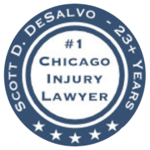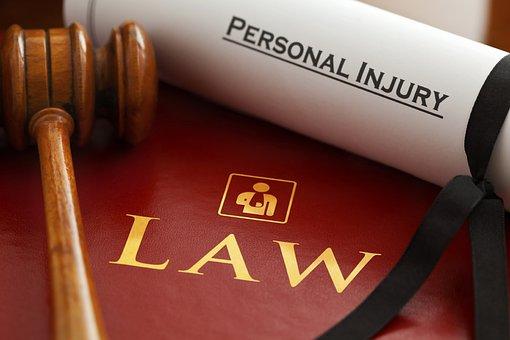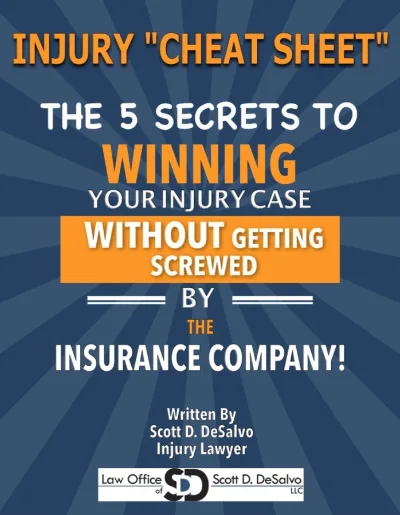




Last spring, I got a call that still makes me angry when I think about it.
A mother from Lincoln Park was calling about her eight-year-old daughter. The little girl had been playing in their front yard when a neighbor's pit bull broke free from a weak leash and attacked her. Bit her face. Bit her arms. The child needed emergency surgery at Lurie Children's Hospital and she's going to have permanent scars.
But here's the part that really gets me: neighbors had been complaining to the dog owner for months about that dog's aggressive behavior. The owner knew. He just didn't care enough to do anything about it.
Now that little girl is terrified every time she sees a dog. Any dog. She has nightmares. She's in therapy. And her face will never look the same.
That case reminded me why I became a dog bite lawyer in Chicago. Because when dog owners ignore warning signs and let dangerous animals run free, innocent people—especially kids—suffer life-changing injuries. And somebody needs to hold them accountable.
If you or your child has been attacked by a dog anywhere in Chicago, you're dealing with more than just physical wounds right now. You're probably scared. You're definitely stressed about medical bills. Maybe you're worried about permanent scars. And if it was your child who got hurt, you're probably blaming yourself even though it wasn't your fault.
I'm here to tell you: the dog owner is responsible. Not you.
Whether you were bitten by a neighbor's dog in Rogers Park, attacked while jogging in Grant Park, or hurt by an aggressive dog in Wicker Park, Illinois law is on your side. Dog owners are strictly liable when their animals attack people. That means they're responsible, period—even if their dog has never bitten anyone before.
I've been handling these dog bite cases all over Chicago for years. I know Illinois dog bite law inside and out. I know how to prove owner liability. And I know how to maximize your compensation for medical bills, scars, emotional trauma, and everything else you've been through.
Here's my promise to you: you don't pay a penny out of pocket. You don't pay me unless we win. And you can call me any time—literally any time, day or night,weekends, holidays—I don't care. If you need to talk, I'm here.
Let me walk you through what you need to know about dog bite cases in Chicago.
No legal jargon. No BS. Just straight talk about your rights and how to protect them.

Here's something important you need to understand: Illinois has some of the strictest dog bite laws in the country. And that's really good news for victims.
Most states have what's called a "one bite rule." That means the first time a dog bites someone, the owner might not be responsible because "how were they supposed to know their dog would do that?"
That's garbage.
Illinois doesn't work that way. Under the Illinois Animal Control Act, dog owners are strictly liable when their dogs attack people. What does "strictly liable" mean in plain English?
It means if their dog bites you, they're responsible. Period. End of story.
They can't say "my dog has never bitten anyone before." They can't claim "I didn't know my dog was dangerous." They can't blame you for getting hurt. If you were lawfully where you were supposed to be—on a public sidewalk, in a park, visiting someone's home with permission, delivering packages—and their dog attacked you without provocation, the owner is liable.
That's the law in Illinois. And it's one of the strongest dog bite laws in the country.
There are only a few exceptions:
But here's the thing: Illinois courts define "provocation" really narrowly. Simply walking past a dog, petting a dog with the owner's permission, or being in the dog's vicinity doesn't count as provocation. You'd have to do something like kick the dog or intentionally hurt it for that defense to work.
As your Chicago dog bite attorney, I make sure the owner can't use any of these weak defenses to avoid responsibility.
Over the years, I've seen just about every type of dog attack you can imagine. And I'll tell you something: these attacks are almost always preventable.
Let me walk you through the most common reasons dogs attack people.
This is the big one. Dogs escape from yards with inadequate fencing. They break free from weak leashes. They're allowed to roam around unleashed in areas where Chicago leash laws require them to be leashed.
Chicago has clear leash laws. Dogs are supposed to be on leashes in public areas.
But some owners think the rules don't apply to them. "Oh, my dog is friendly." "My dog listens to voice commands." "My dog would never hurt anyone."
Until their dog does hurt someone.
When a dog escapes or isn't properly controlled and attacks someone, the owner is 100% liable.
Some dog owners know their animals have shown aggression—growling at strangers, lunging at people, even previous biting incidents—but they don't warn visitors, neighbors, or delivery workers.That's negligence. Plain and simple.
If you own a dog that you know can be aggressive, you have a responsibility to warn people. You have a responsibility to take extra precautions. When owners don't do that and someone gets hurt, they're liable for not providing adequate warning.
Dogs that aren't properly trained or socialized can become aggressive and unpredictable. Some owners get dogs—especially powerful breeds—without investing time in training or proper socialization.
Certain breeds require experienced handlers. They need to be socialized from an early age. When owners skip these steps, they're creating dangerous situations. And when attacks happen, they're liable.
Dogs naturally protect their territory. That's just dog behavior. But responsible owners manage that behavior.
If a dog has shown territorial aggression, the owner needs to take precautions. Post warning signs. Secure the dog when visitors arrive. Use proper fencing. Install barriers.
When owners fail to manage known territorial aggression and someone gets attacked, that's on them.
Let me be clear: any dog can bite. I've handled cases involving every breed you can think of.
But certain breeds are statistically more likely to cause serious injuries because of their size, strength, and bite force. Pit bulls. Rottweilers. German Shepherds.Dobermans. These are powerful animals.
When people own these breeds, they need to be extra responsible. Strong leashes. Secure fencing. Muzzles in public if the dog has shown any aggression. Proper training.
When owners of powerful breeds fail to take appropriate precautions, they're creating unreasonable risks.
Answer a few questions to get an estimate of your case value
Let me tell you something: dog bite injuries are not minor.
When people think "dog bite," they sometimes picture a little nip that needs a Band-Aid. That's not what I'm talking about.
The cases I handle involve serious, life-changing injuries.
Dogs' teeth create deep puncture wounds that penetrate skin, muscle, sometimes even bone. These wounds carry high infection risks.
Dog saliva contains bacteria—Pasteurella, Staphylococcus, in rare cases even rabies. Even bites that seem minor can become serious if infection develops.
Deep lacerations often require stitches, sometimes surgery, and they leave permanent scars. Facial injuries are particularly devastating, especially for children.
Dog attacks cause significant damage to soft tissue—torn muscles, severed tendons, nerve damage.
These injuries often require reconstructive surgery and months of physical therapy.
Nerve damage can result in permanent loss of sensation or mobility. When dogs shake their heads during attacks, they cause additional tearing that makes injuries even worse.
Powerful dogs can break bones, especially in children and elderly victims.
Hand and arm fractures happen when people try to defend themselves. Facial bone fractures occur during attacks to the head and face. These injuries often require surgery with pins, plates, or screws, followed by extensive rehabilitation.
This is the one that breaks my heart, especially with kids.
Dog attacks to the face cause devastating injuries. Children are often at face-level with medium and large dogs. Facial scarring affects victims' appearance and self-esteem for life.
Plastic surgery can help, but it rarely eliminates scars completely. Children may require multiple surgeries as they grow. The emotional impact of facial disfigurement is enormous.
Beyond physical injuries, dog attacks cause serious psychological harm.
Victims—especially children—develop lasting fear of dogs. Anxiety in public spaces. Nightmares. PTSD symptoms. Some kids need years of therapy to overcome the trauma.
Adults who were comfortable around dogs before attacks may never regain that comfort. This emotional suffering deserves compensation just like physical injuries.
Dog bites carry serious infection risks. Beyond common bacterial infections, victims face potential rabies exposure if the dog's vaccination status is unknown.
Infections can spread rapidly, causing cellulitis, sepsis, and other life-threatening conditions. Victims often need hospitalization, intravenous antibiotics, and additional surgeries to address infection complications.
I've had clients who ended up in the hospital for weeks dealing with infections from dog bites that initially didn't seem that bad.



Every case is different, but Illinois law allows you to recover both economic and non-economic damages.
My goal in every case is getting you every dollar you deserve—not just for your current bills, but for the long-term impact this attack will have on your life.
Every penny you've spent or will spend on medical care. Emergency room treatment. Ambulance. Surgery. Hospital stays. Doctor appointments. Specialists. Diagnostic tests. Medications. Physical therapy. Plastic surgery for scarring. Psychological counseling. Future medical care.
I've had dog bite clients whose medical bills reached six figures. Especially kids who need multiple plastic surgeries as they grow.
If your injuries kept you from working, you deserve compensation for every dollar you lost. Lost salary. Lost bonuses. Lost benefits. If you're self-employed, lost income from your business.
Serious injuries might mean you can't go back to your old job. Or maybe you can work but not at the same level. You deserve compensation for that reduced earning capacity.
Transportation to medical appointments. Home modifications if needed. Child care costs if your injuries prevented you from caring for your kids. All of it counts.
The physical pain you've endured and will continue experiencing. Illinois has no cap on pain and suffering in dog bite cases.
Anxiety. Depression. PTSD. Fear of dogs. This is especially significant for children who develop lasting trauma from attacks.
Not being able to do activities you used to enjoy. For kids, maybe they can't play at parks anymore because they're terrified of dogs. For adults, maybe you've given up jogging or outdoor activities.
Permanent scars affect how you feel about yourself and how others see you. Especially facial scars. This deserves serious compensation.
When children are injured in dog attacks, damages include not only immediate medical care but also:
Children's cases often result in higher settlements because injuries affect them for more years and developmental stages.
In cases involving particularly reckless dog owners—those who knew their dog was dangerous and took no precautions, or those who intentionally encouraged aggressive behavior—Illinois courts may award punitive damages.
These damages punish the owner and deter similar conduct. When appropriate, I pursue them aggressively.

Let me be blunt: dog owners and their insurance companies will use every trick they know to avoid paying what you deserve.
I've handled hundreds of these cases. I've seen every defense. I know their playbook.
This is their go-to defense. They'll claim you were teasing the dog, approached it aggressively, or startled it.
But Illinois courts interpret provocation narrowly. Simply petting a dog, walking past it, or being near it doesn't constitute provocation.I gather evidence proving you engaged in normal, non-threatening behavior when the attack occurred.
Owners may claim you were trespassing without permission. If you were legitimately invited to the property or were lawfully present—mail carrier, delivery driver, invited guest—this defense fails.
I obtain evidence of your lawful presence through witness testimony, delivery records, or other documentation.
Insurance adjusters routinely minimize injuries. They'll claim bites weren't severe, scars will fade, psychological trauma is exaggerated.
I combat this with comprehensive medical documentation, expert testimony about permanent scarring and psychological impact, and your own testimony about how injuries have affected your daily life.
Insurance companies make quick, low offers hoping you'll accept before consulting an attorney.
These offers rarely cover full damages. And once you accept and sign a release, you can never get more money—even if complications develop.
Never—and I mean NEVER—accept a settlement without having me review it first.
Find Out What YOUR Case Might Be Worth...for free.
Illinois law gives you two years from the date of the dog attack to file a personal injury lawsuit. Two years might seem like a long time, but it's not.
Evidence disappears fast. Witnesses forget details. The dog may be removed from the area. Animal control records can be hard to obtain later.
If the victim is a minor, the two-year clock doesn't start until they turn 18. So they have until age 20 to file.
But don't wait. The sooner you hire me, the better positioned we are to preserve evidence and build a strong case.
Here's what you absolutely must understand: if you miss the deadline, you lose your right to compensation forever.
It doesn't matter how badly you were hurt. It doesn't matter if the owner admits their dog was dangerous. If you file even one day late, the court dismisses your case without looking at it.
Don't wait. Call me now.
Look, I'm not going to give you some slick sales pitch. That's not who I am.
But I want you to understand what makes my practice different.
When I was nine years old, my father was catastrophically injured at work. He was a truck driver, a T eamster, and the toughest guy I knew.
That injury changed everything for our family.
His case took 17 years to resolve. Seventeen years of being run around by insurance companies and lawyers. And at the end of those 17 years, his own lawyer sued him for more fees.
We grew up poor after my father couldn't work anymore. I watched my family struggle. I watched the legal system fail us.
That's why I became a personal injury lawyer. To make sure what happened to my father never happens to anyone else.
I know what it's like to be the family member of someone who's been hurt. The fear. The uncertainty. The financial stress.
That experience shaped who I am as a lawyer. It's why I treat every client like family. It's why I return phone calls. It's why I explain things in plain English. It's why I fight so hard.
Your fight is my fight. That's not just a slogan. It's the truth.
Most lawyers do the bare minimum for continuing education. Show up to a seminar once a year. Sit in the back. Check the box.
Not me.
I've spent over $100,000 and thousands of hours on advanced training most lawyers never even consider.
I'm a graduate of the world-renowned Gerry Spence Trial Lawyer's College. I'm a graduate of the prestigious "The Edge" program. Not one in 10,000 lawyers has completed the training I have.
Why did I invest all that time and money?
For one reason: so you get the very best, most cutting-edge and effective representation possible.
When I'm negotiating or in a courtroom, insurance companies and defense lawyers know I've trained with the best. They know I'm not bluffing when I say I'll take a case to trial. They know I have the skills to win.
That makes them more likely to offer fair settlements. And when they don't, I'm ready to go to court.
Big personal injury firms handle hundreds or thousands of cases at once. When you call, you'll deal with paralegals, case managers, junior associates—everyone except the actual lawyer.
I do things differently.
When you call my office, you talk to me. When you have questions, I answer them. I personally handle your case from start to finish.
I limit my caseload so every client gets real, personal attention. You'll have my cell phone number. I'll return your calls promptly. You'll never wonder what's happening with your case.
Some people want the big firm with the fancy TV commercials. That's fine.
But if you want a lawyer who actually knows your name, remembers the details of your case, and genuinely gives a damn about what happens to you, call me.
Some lawyers settle cases cheap and fast because they want to move on to the next one.
That's not me. I don't settle for less than your case is worth. When insurance companies make unreasonable offers, I'm fully prepared to take cases to trial.
My willingness to actually try cases gets us better settlements because insurance companies know I'm serious.
Let me be super clear: you pay nothing upfront. No retainer. No hourly fees. Nothing out of pocket.
I work on contingency. I only get paid if we win.
I even advance all case expenses. Filing fees. Expert costs. Investigation. Medical records. Everything.
If we don't recover money for you, you owe me nothing. Not a penny.
In personal injury cases, my fee is 33⅓% if we settle before trial, or 40% if we have to go to court. These are standard rates.
Pretty good deal, right? (Yes, that's my sense of humor creeping in.)
Dog attacks happen unexpectedly. Your child might get bitten on a Saturday afternoon. You might be attacked on a Sunday morning.
That's why you can call me any time—24 hours a day, 7 days a week, 365 days a year.
Middle of the night? Weekend? Holiday? Doesn't matter. If you need to talk, I'm here.

The actions you take immediately after a dog attack make a huge difference.
Here's exactly what to do:
Your health is the top priority. Always.
Even if the bite seems minor, see a doctor immediately. Some serious problems—infections, nerve damage, deeper tissue damage—don't show up right away.
For severe injuries, go to the emergency room. For less serious bites, see your doctor within 24 hours.
Beyond your health, this matters legally. Insurance companies will claim "if they were really hurt, they would've gone to the hospital immediately."
Don't give them that argument.
Contact Chicago Animal Control at (312) 744-5000 immediately. File a police report too.
These official reports create a record of the attack before the owner can change their story. Animal control will investigate the dog, potentially quarantine it to check for rabies, and document any prior incidents.
Photograph your injuries immediately and throughout healing. Photograph where the attack happened. Get contact information from witnesses. Get the dog owner's name, address, phone number, and insurance information. Save all medical records, bills, and receipts.
Don't wash the clothing you wore during the attack. Tears and blood stains provide evidence of injury severity.
I've had cases where damaged clothing helped prove exactly how violent an attack was.
The dog owner's insurance company will call asking for a recorded statement.
Politely decline. Say: "I'd prefer to provide a statement after I've talked to my attorney."
Insurance adjusters use these statements to minimize claims or shift blame to victims.
It's your legal right to decline. They can't hold it against you.
Insurance companies make fast, low offers hoping you'll settle before talking to a lawyer.
These offers rarely cover full damages. Once you accept and sign a release, you can never get more money—even if complications develop.
Let me review any offer first. The consultation is free.
The sooner you hire me, the sooner I can preserve evidence, interview witnesses, and protect your rights.
Don't wait weeks or months. Evidence disappears. Witnesses forget. The dog may be moved. Call me today.

See a doctor within 24-48 hours. Go to your doctor, an urgent care, or the ER. Don't wait. Delayed treatment gives insurance companies ammunition to deny your claim. Soft tissue injuries, whiplash, concussions, and internal injuries may not be obvious immediately.
Keep records of everything. Medical bills. Prescriptions. Time off work. Pain levels. How your injuries affect your daily life. Document it all. Keep a journal of your recovery, symptoms, doctor visits, and how the injuries impact your ability to work and enjoy life.
Follow your doctor's treatment plan. Insurance companies look for gaps in treatment. If you miss appointments or don't follow medical advice, they'll claim you weren't really injured or that you made your injuries worse by not following treatment.
Don't post on social media. Insurance companies are watching. That photo of you smiling at a family gathering? They'll use it to claim you're not really injured. Stay off Facebook, Instagram, Twitter, all of it until your case is resolved. Insurance adjusters will scour your profiles looking for anything to use against you.
Don't sign anything from the insurance company. Medical release forms, settlement offers, recorded statement authorizations—don't sign ANYTHING without talking to me first. These documents can waive your rights and give insurance companies access to your entire medical history to find unrelated conditions to blame for your injuries.
Call me before you do anything else. The insurance company will pressure you to give a statement, sign a release, or accept a settlement. Don't do any of it without talking to me first. My consultation is free, and I'm available 24/7 at (312)-500-4500.

I hear this a lot. People hesitate to pursue claims against people they know.
Here's the thing: you're pursuing compensation from their insurance company, not their personal money. Homeowner's insurance exists specifically for these situations.
Your friend or family member won't personally pay your damages—their insurance will. Don't let personal relationships stop you from getting the compensation you deserve.
Illinois law defines provocation narrowly. Simply petting a dog, walking past it, or being near it doesn't count as provocation.
I gather evidence proving you engaged in normal, non-threatening behavior when the attack occurred.
Yes, as long as you were lawfully present. If you were invited to the property or there lawfully (mail carrier, delivery driver, invited guest), you can pursue compensation.
Simple cases with clear liability and moderate injuries may settle within months.
Complex cases with severe injuries or disputed liability may take longer.
I work efficiently but never sacrifice thoroughness for speed.
Most homeowners and renters carry liability insurance that covers dog bites. If they don't, I investigate the owner's personal assets, check for umbrella policies, and explore your own insurance coverage.
Don't assume there's no recovery just because someone claims they don't have insurance.
Hiring Scott was one of the best moves I have made in my life. Scott is a down to earth person and attorney. Scott is a 5 star first class act who really knows his stuff. The Judge said his presentation was one of if not the best he had ever seen. Take my advice, hire Scott I’m sure you’ll be 200% satisfied I was.

Scott not only cares about the case, but he truly cares about his clients and that makes him the best lawyer I have ever met and hired! He won my case! He is thorough in everything he does. I highly recommend Scott, and will always refer him to family and friends.

I hired Scott DeSalvo upon a friend’s recommendation. His office kept me informed of developments as they happened, and I felt the settlement reached was fair considering my injuries. I would highly recommend Scott DeSalvo to represent your personal injury case.

My practice serves clients throughout the Chicago metropolitan area—all Chicago neighborhoods from Rogers Park to Beverly, and suburban communities across Cook County, DuPage County, Lake County, and Will County.
Whether your dog attack happened in the city or suburbs, I'm here to help.

Look, I'm not going to pressure you. I never chase clients. I never hustle and harass people.
We talk like friends.
But if you or your child has been hurt in a dog attack, you deserve to know your rights. You deserve to know if you have a case. And you deserve to know what it might be worth.
Here's how it goes:
Step 1: You call (or I can call you at a time that works).
Step 2: I listen to your story. Really listen.
Step 3: I answer your questions. Plain English, no legal jargon.
Step 4: I'll tell you honestly if I think you have a case and what I can do to help.
Step 5: You decide whether to hire me. Your choice. Zero pressure.
Step 6: Either way, we end up as friends.
Sound good?

You can reach me 24 hours a day, 7 days a week, 365 days a year at (312) 500-4500.
Or if you're not quite ready to talk, visit desalvolaw.com and tell me about your situation. I'll get back to you quickly.
Don't let negligent dog owners escape responsibility. Don't let insurance companies convince you to accept less than you deserve.
You or your child were attacked by a dangerous animal because someone failed to control it. That's not fair. And it's not your fault.
I look forward to hearing from you.
Your fight is my fight. Let's get you the justice and compensation you deserve.


Scott DeSalvo founded DeSalvo Law to help injured people throughout Chicago and surrounding suburbs. Licensed to practice law in Illinois since 1998, IARDC #6244452, Scott has represented over 3,000 clients in personal injury, workers compensation, and accident cases.
No Fee Unless You Win | Free Consultation | 24/7 Availability Call or Text: (312) 500-4500
>>Read More
Main Office:
1000 Jorie Blvd Ste 204
Oak Brook, IL 60523
New Cases: 312-500-4500
Office: 312-895-0545
Fax: 866-629-1817
service@desalvolaw.com
Chicago and Other Suburban Offices
By Appointment Only